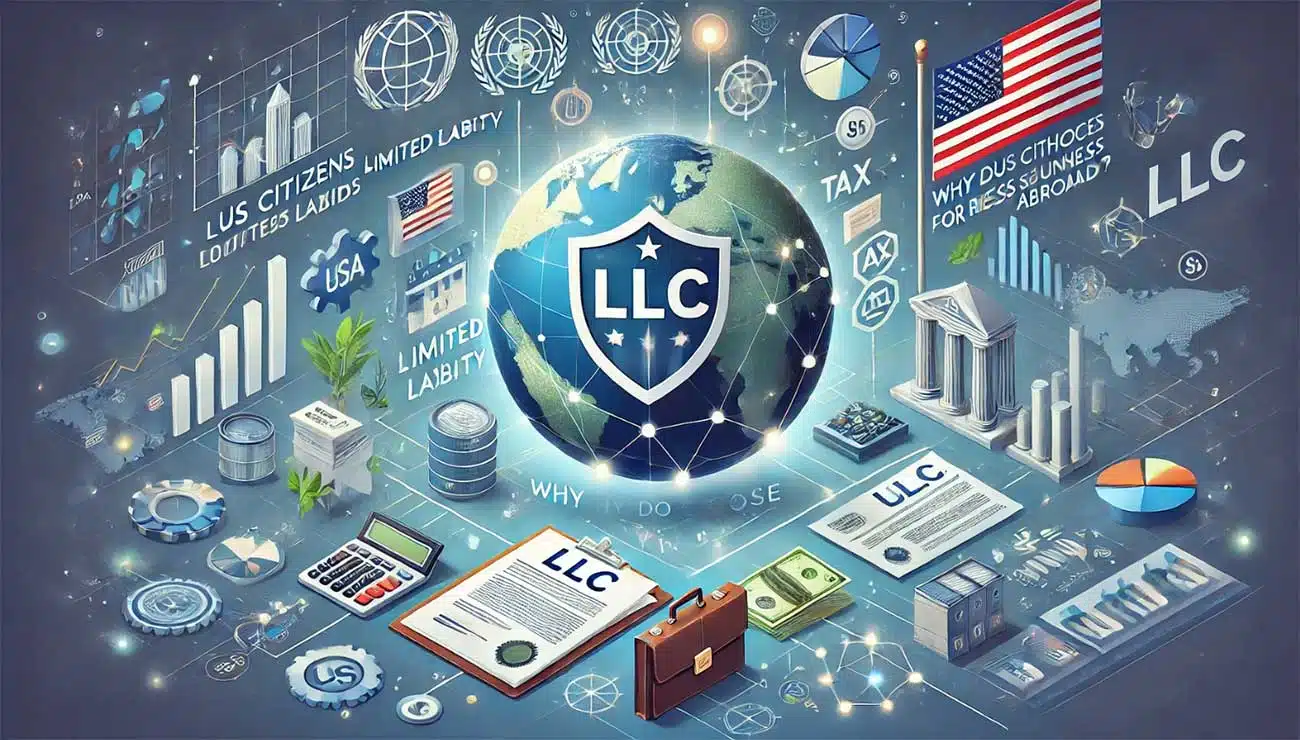Detailed LLC Ownership Tax Rules for US Citizens Living in New Zealand
Understanding the tax rules surrounding LLC ownership can be particularly complex for US citizens living in New Zealand. This article aims to clarify the nature of Limited Liability Companies (LLCs), their tax implications, the benefits of tax treaties, and common challenges that business owners may encounter. By examining these aspects, US citizens can make informed decisions about their LLC ventures in New Zealand.
Need Help Filing Your Taxes?
Understanding LLCs: What Are They?
What is a Limited Liability Company (LLC)?
A Limited Liability Company (LLC) is a unique business structure that combines the flexibility of a partnership with the liability protection of a corporation. LLC members enjoy protection from personal liability regarding business debts and obligations. This means that creditors cannot pursue the members’ personal assets to satisfy business liabilities. LLCs provide a pass-through taxation structure, allowing profits to be taxed at the individual level rather than at the corporate level. This feature makes LLCs particularly appealing for small business owners seeking to minimize tax burdens while maximizing personal asset protection.
The flexibility in tax classification allows LLCs to choose how they wish to be taxed, whether as a sole proprietorship, partnership, or corporation. This adaptability enables LLC owners to structure their business in a way that aligns with their financial goals. For US citizens forming an LLC in New Zealand, understanding the implications of this business entity is essential for effective tax planning and compliance. The limited liability aspect is crucial, especially for entrepreneurs looking to mitigate risks associated with business operations while enjoying the benefits of business deductions and tax advantages.
How does an LLC differ from other business structures?
LLCs differ significantly from other business structures such as sole proprietorships, corporations, and partnerships. Unlike a sole proprietorship, where the owner is personally liable for all debts, an LLC shields its members from personal liability. In contrast to a corporation, an LLC typically has fewer formalities and ongoing compliance requirements, making it easier to manage while still providing liability protection. Corporations face double taxation, where both corporate profits and dividends are taxed, whereas LLCs generally benefit from pass-through taxation, avoiding this issue altogether.
LLCs offer greater flexibility in management and ownership structures compared to other entities. For instance, LLCs can have single-member or multi-member configurations, allowing for diverse ownership arrangements. This flexibility is particularly beneficial for US citizens seeking to establish businesses in New Zealand, as it accommodates various investment strategies and operational styles. Understanding these distinctions is vital for making informed decisions regarding the most suitable business structure for one’s unique circumstances and objectives.
Why do US citizens choose LLCs for business ventures abroad?
US citizens often choose LLCs for their overseas business ventures due to several compelling advantages. Firstly, the limited liability protection that LLCs offer is crucial for safeguarding personal assets from business-related risks. This is particularly appealing in foreign markets where legal and financial systems might differ significantly from those in the US. The pass-through taxation feature allows LLC owners to report business income directly on their personal tax returns, simplifying tax compliance and potentially lowering overall tax liabilities.
Forming an LLC in New Zealand can facilitate easier access to local markets and resources. LLCs are perceived as legitimate business entities, which can enhance credibility with partners, clients, and investors. This credibility is essential for building trust and establishing fruitful business relationships. The combination of these factors makes LLCs a popular choice among US citizens looking to expand their business footprint internationally while ensuring compliance with both US and local tax regulations.

Tax Implications of LLC Ownership for US Citizens
What are the basic tax obligations for LLC owners in New Zealand?
US citizens owning an LLC in New Zealand must also consider their obligations under US tax law. The Internal Revenue Service (IRS) requires US citizens to report their worldwide income, including business income generated from foreign LLCs. This means that LLC owners may be subject to self-employment tax in the US, adding another layer of complexity to their tax obligations. Staying informed about both New Zealand and US tax requirements is essential for LLC owners to ensure compliance and avoid potential penalties.
How does the IRS view LLCs owned by US citizens abroad?
The IRS classifies LLCs owned by US citizens abroad based on their tax treatment and structure. Generally, single-member LLCs are considered disregarded entities, meaning that their income is reported on the owner’s individual tax return, similar to a sole proprietorship. Multi-member LLCs, however, are treated as partnerships for tax purposes, requiring the filing of Form 1065 to report income and expenses. Regardless of the classification, US citizens must adhere to the IRS guidelines concerning foreign income reporting and tax obligations.
The IRS mandates that US citizens must file additional forms, such as the Foreign Bank Account Report (FBAR), if they hold foreign bank accounts exceeding a certain threshold. Failure to comply with these requirements can result in significant penalties. Understanding how the IRS views LLCs is crucial for US citizens to navigate their tax responsibilities effectively and avoid any legal complications that may arise from non-compliance.
What forms and filings are required for tax compliance?
Tax compliance for LLC owners involves several key forms and filings, both in New Zealand and the United States. In New Zealand, LLCs must file an annual income tax return, detailing their business income and expenses. Depending on the business structure, LLCs may also need to file GST returns if applicable. For US citizens, the tax filing process is more complex, as they must report all worldwide income to the IRS.
US citizens owning an LLC abroad typically must file an individual income tax return (Form 1040) and report any income generated from the LLC. Single-member LLC owners must include their business income on Schedule C, while multi-member LLCs must file Form 1065, along with providing each member a Schedule K-1. Understanding these filing requirements is essential for ensuring compliance and avoiding potential audits or penalties from tax authorities in both countries.
Need Help Filing Your Taxes?
Tax Treaties: Are There Benefits for US Citizens in New Zealand
What is a tax treaty and how does it work?
A tax treaty is a bilateral agreement between two countries designed to avoid double taxation and prevent tax evasion. These treaties typically specify which country has the right to tax different types of income, thereby reducing the risk of individuals being taxed on the same income in both jurisdictions. For US citizens in NZ, the US-New Zealand tax treaty provides a framework for determining tax obligations and ensuring that business income is not subject to double taxation, which can significantly alleviate the tax burden on LLC owners.
Tax treaties often provide mechanisms for resolving disputes and clarifying tax treatment, which can be beneficial for US citizens navigating the complexities of international taxation. Understanding the provisions of the tax treaty can empower LLC owners to take advantage of specific benefits and exemptions, optimizing their overall tax situation. By leveraging the benefits of the tax treaty, US citizens can focus more on their business operations rather than being overly burdened by tax obligations.
Can the US-New Zealand tax treaty help avoid double taxation?
The US-New Zealand tax treaty plays a crucial role in helping US citizens avoid double taxation on their LLC income. Under this treaty, specific types of income, such as dividends, interest, and royalties, are subject to reduced withholding tax rates or exemptions, depending on the circumstances. This arrangement allows LLC owners to retain more of their income while fulfilling their tax obligations in both countries. By taking advantage of the treaty provisions, US citizens can ensure that they are not taxed twice for the same income, which can significantly enhance their financial viability in the foreign market.
The tax treaty establishes clear guidelines for determining residency and tax obligations, providing a degree of certainty for US citizens operating LLCs in New Zealand. Familiarity with these provisions is essential for effective tax planning and compliance. By understanding how to navigate the treaty benefits, LLC owners can strategically position their business operations to minimize tax liabilities and enhance profitability, ultimately contributing to sustained business growth in New Zealand.
What specific benefits does the tax treaty provide for LLC owners?
The tax treaty offers several specific benefits to LLC owners, with the primary advantage being the reduction of withholding taxes on various income types. For instance, dividends paid to US citizens from New Zealand LLCs may be subject to lower withholding tax rates, thus allowing for greater net income retention. Similarly, interest and royalties may also qualify for reduced rates, enhancing the overall financial health of the LLC. These benefits can significantly improve cash flow and the ability of LLC owners to reinvest in their businesses.
The treaty provides clarity regarding residency status and the allocation of taxing rights, which is particularly important for US citizens with dual tax obligations. By establishing a clear framework for tax treatment, the treaty minimizes the risk of disputes and ensures that US citizens can confidently navigate their tax responsibilities. Understanding these specific benefits allows LLC owners to make informed decisions about their business strategies and optimize their tax positions while maintaining compliance with both US and New Zealand tax regulations.

Tax Deductions and Credits: What Can You Claim?
What expenses are deductible for LLC owners in New Zealand?
LLC owners in New Zealand can claim various business deductions to reduce their taxable income. Common deductible expenses include operating costs such as rent, utilities, salaries, and wages for employees. LLC owners can deduct costs related to business travel, advertising, and professional services, which contribute to the overall functioning and success of the business. These deductions play a crucial role in lowering the LLC’s taxable income and, in turn, the overall tax liability.
Specific expenses related to forming an LLC, such as legal fees and registration costs, may also be deductible. Knowing which expenses qualify for deductions is essential for effective tax planning and maximizing potential tax benefits. By keeping accurate records and receipts, LLC owners can ensure that they are taking full advantage of available deductions, ultimately enhancing their financial position and allowing for reinvestment in growth opportunities.
Are there tax credits available for US citizens owning an LLC abroad?
US citizens owning an LLC abroad may be eligible for certain tax credits that can alleviate their tax burdens. One notable credit is the Foreign Tax Credit, which allows US citizens to offset taxes paid to a foreign government against their US tax liability. This can be particularly beneficial for LLC owners who are subject to income tax in both New Zealand and the US, as it helps mitigate the impact of double taxation. By claiming this credit, LLC owners can effectively reduce their overall tax liability, making their business operations more financially viable.
The IRS ALSO offers a Foreign Earned Income Exclusion, which permits eligible US citizens to exclude a portion of their foreign-earned income from US taxation. This exclusion can provide significant tax relief for LLC owners, allowing them to retain more of their income for reinvestment and personal use.
How can LLC owners maximize their deductions and credits?
To maximize deductions and credits, LLC owners should maintain meticulous records of all business-related expenses and income. Implementing robust accounting practices and utilizing accounting software can streamline this process, ensuring that no deductible expense goes unclaimed. LLC owners should regularly review their financial statements to identify potential deductions and consult with tax professionals knowledgeable about both US and New Zealand tax regulations.
Strategic tax planning is crucial. LLC owners should consider timing their expenses and income recognition to optimize their tax positions. For example, deferring income or accelerating deductible expenses can lead to lower taxable income in a given tax year. By actively engaging in tax planning and leveraging available deductions and credits, LLC owners can significantly enhance their financial outcomes and ensure compliance with all applicable tax laws.
Need Help Filing Your Taxes?
Common Challenges and Considerations
What are the common pitfalls for US citizens owning an LLC in New Zealand?
US citizens owning an LLC in New Zealand may encounter various pitfalls that can complicate their business operations and tax compliance. One common challenge is the complexity of navigating the dual tax obligations that arise from operating in a foreign jurisdiction while remaining subject to US tax laws. This complexity can lead to unintentional non-compliance, resulting in penalties and additional tax liabilities. US citizens must be mindful of the differing tax deadlines and requirements in both countries, which can further complicate tax filing processes.
Another potential pitfall is the misclassification of the LLC for tax purposes. Failing to understand the implications of being classified as a single-member or multi-member LLC can result in inappropriate tax filings and missed opportunities for tax benefits. Furthermore, some business owners may overlook the importance of maintaining adequate documentation for all income and expenses, which is essential for substantiating deductions during tax filing. By recognizing these common pitfalls, US citizens can take proactive steps to mitigate risks and ensure successful LLC management.
How can you navigate the complexities of tax compliance?
Navigating the complexities of tax compliance as an LLC owner in New Zealand requires a proactive and informed approach. One effective strategy is to engage US Tax Pros, they’re a tax professional with expertise in both US and New Zealand tax regulations. These professionals can provide valuable guidance on tax obligations, help optimize tax strategies, and ensure compliance with all filing requirements.
US Tax Pros will help you develop a comprehensive tax compliance plan that will help you navigate of these complexities. The plan will outline all relevant deadlines, required forms, and necessary documentation for both jurisdictions. US Tax Pros can regularly review and update plans can help LLC owners stay on top of their tax responsibilities. By taking these steps, US citizens can streamline their tax compliance efforts and focus on growing their businesses while remaining compliant with applicable laws.
What resources are available for US citizens to assist with tax issues?
Several resources are available to assist US citizens with tax issues related to LLC ownership in New Zealand. The IRS provides a wealth of information and guidance specifically for US citizens living abroad, including publications and forms that outline tax obligations and available credits. The US Embassy in New Zealand can offer insights and support for Americans navigating the complexities of international taxation.
There are several professional organizations and tax advisory firms including US Tax Pros, that specialize in expatriate tax services. These firms can provide personalized assistance tailored to the unique circumstances of US citizens owning LLCs abroad. Online communities and forums can also serve as valuable resources, allowing business owners to share experiences and advice regarding tax compliance and best practices. By leveraging these resources, US citizens can effectively manage their tax responsibilities and enhance their overall business success in New Zealand.

Conclusion: What Should You Do Next?
What key takeaways should US citizens remember about LLC ownership in New Zealand?
US citizens considering LLC ownership in New Zealand should remember several key takeaways. Firstly, understanding the unique tax implications of operating an LLC abroad is crucial for compliance and financial success. Familiarity with both US and New Zealand tax laws, including the specific forms and filings required, can significantly reduce the risk of penalties and ensure that business owners take full advantage of available deductions and credits. Also, by being aware of the benefits provided by the US-New Zealand tax treaty it can help mitigate double taxation and optimize tax outcomes.
LLC owners should prioritize maintaining accurate records of all business transactions to substantiate claims for deductions and credits. Engaging a qualified tax professional such as US Tax Pros can provide invaluable support in navigating the complexities of international taxation, enabling business owners to focus on their core operations. By keeping these takeaways in mind, US citizens can successfully manage their LLC ventures in New Zealand and achieve their business objectives.
How can you stay updated on tax regulations and changes?
Staying updated on tax regulations and changes is essential for US citizens owning LLCs in New Zealand. Regularly reviewing IRS publications and the official websites of both the IRS and the New Zealand tax authorities can provide critical information about tax law updates and compliance requirements. Subscribing to newsletters from reputable tax advisory firms such as US Tax Pros can offer insights into emerging trends and changes in international tax regulations.
Participating in webinars and workshops focused on expatriate taxation can also enhance understanding of current issues and best practices. Engaging with professional networks and associations that specialize in international business can facilitate knowledge sharing and provide access to valuable resources. By proactively seeking out information and remaining informed, LLC owners can effectively navigate the evolving landscape of international taxation and ensure compliance with all applicable regulations.
Should you consult a tax professional for personalized advice?
Engaging a qualified tax professional is crucial for US citizens owning an LLC in New Zealand. At US Tax Pros, we specialise in providing tailored advice to ensure full compliance with both US and New Zealand tax laws. Our expertise extends to identifying potential tax benefits and deductions that are often overlooked, helping to maximise your LLC’s financial position. We also guide you through the complexities of the US-New Zealand tax treaty, offering clarity on its implications for your business.
With US Tax Pros, you gain access to strategic planning solutions designed to optimise tax outcomes and navigate the challenges of dual tax obligations. Our team of seasoned professionals simplifies the tax process, saving you time and minimising stress. Let us handle the complexities so you can focus on growing your business. Contact US Tax Pros today to safeguard your LLC’s financial health and ensure compliance with international tax regulations.

